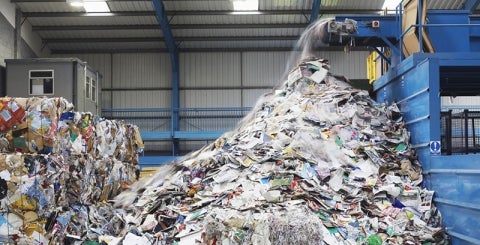Note: Yale School of the Environment (YSE) was formerly known as the Yale School of Forestry & Environmental Studies (F&ES). News articles and events posted prior to July 1, 2020 refer to the School's name at that time.

Researchers from the Yale School of Forestry & Environmental Studies (F&ES) will play a lead role in a new U.S.-funded consortium that will aim to improve the energy efficiency of the nation’s industrial manufacturing processes.
The Reducing Embodied-Energy and Decreasing Emissions (REMADE) Institute, based at the Rochester Institute of Technology, will explore strategies to reduce the costs of technologies needed to reuse, recycle, and remanufacture materials such as metals, polymers, fibers, and electronic waste. The project will be supported by a $70 million U.S. Department of Energy grant over five years in addition to $70 million in private cost-share commitments from the institute’s more than 100 partners.
Its goal is to improve energy efficiency in U.S. manufacturing 50 percent by 2027, which would save billions of dollars in energy costs and reduce overall environmental impacts. It is part of the DOE’s “Manufacturing USA” initiative.
For Yale researchers, it will present an opportunity to build upon years of previous research into the lifecycles of metals and other resources, done by the F&ES-based Center for Industrial Ecology (CIE) — and to work with a wide range of partners from academia, industry, and government.
The consortium — which includes experts from 26 universities, 44 companies, seven national labs, and 26 industry trade associations and foundations — will be broken into five research “nodes.”
While the first four groups will tackle efficiency questions related to four distinct areas — industrial design, material optimization, remanufacturing, and recycling of materials, respectively — the fifth group, led by Yale researchers, will provide an ongoing systems analysis on how all these different systems can be integrated to achieve greater efficiency.
“This partnership will offer an exciting opportunity for our School to be at the forefront of this critically important and growing field of knowledge,” said Barbara Reck, a research scientist at F&ES, who will lead the group.
“Our group will provide the big-picture perspective by providing the reference data for measuring efficiency gains in materials and energy use. In doing so, our research will identify valuable resources to be recovered from used products and guide the technological development in identifying technologies that have the largest potential energy savings.”
The deputy lead of the Yale-led group will be Thomas Graedel, a professor emeritus of industrial ecology and former director of the CIE who for more than 15 years has led Yale’s ongoing research into the lifecycle of global metals resources, from mining to recycling.
That research has provided important insights into the sustainability of the planet’s metal resources, from common metals such as copper and zinc to the rare materials that have become critical components of modern products, from medical equipment to smartphones.
Initially, Yale researchers will focus on two specific projects. In one, led by Reck and Graedel, they will characterize the life cycles of metals, polymers and fibers to illustrate the supply chains of these materials, and conduct scenarios on their supply and demand in 10 years to learn, for example, about the composition and magnitude of future recycling flows.
The second project, conducted by Edgar Hertwich, a professor of industrial ecology at F&ES and CIE director, and researchers at the University of California-Santa Barbara, will provide the methodology and data for harmonized life cycle assessments that will make applying this tool much easier to industry partners.
“This partnership will introduce interesting new directions and opportunities that we haven’t pursued in the past because it incorporates consideration of plastic and fiber materials,” said Graedel. “We anticipate that our historic approaches will be readily adaptable to these new groups of materials.”
“In the past, the role of materials has often been ignored,” said Hertwich. “Materials cause energy demand and pollution but contribute tremendously to well-being and offer technological solutions to sustainability challenges. We are looking forward to tackling this challenge together with our industry and research partners.”
Throughout the initiative, Yale researchers will indeed leverage knowledge obtained by working with industry leaders, including those involved at every step of the lifecycle process, from mining of materials to the materials recyclers. In fact, some of those collaborators will serve as partners in the REMADE initiative.
One of those is New York-based Sims Metal Management Limited, the world’s leading publicly traded metals and electronics recycling company.
“Sims is proud to be one of the founding industrial partners in the REMADE Institute to foster the Sims core values of innovation and sustainability and the advancement of resource recycling,” said Galdino Claro, Group CEO and Managing Director at Sims. “We look forward to applying the technical developments that will come through our collaboration with the Yale Center for Industrial Ecology and the REMADE Institute and believe that it will help to advance the significant efficiencies that come from the recovery and reuse of core resources.”
At Yale, the REMADE Institute will provide a range of relevant research opportunities for researchers, labs and centers across F&ES, Reck said.
“One of the most exciting parts of this set of partnerships is that it will present a unique opportunity to integrate our expertise across multiple perspectives — industry, education, and scholarship — and disciplines,” said F&ES Dean Indy Burke.
While the DOE grant will help support the institute for the first five years, the ultimate goal is for the REMADE Institute to become permanent and self-supporting.
